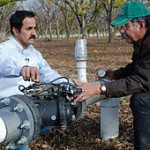September 20th, 2018
 Chances are now that summer is here, you are using your irrigation system regularly. However, don’t forget that irrigation systems need to be prepared for winter months in any areas where they will be shut down and not in use. Sprinkler systems that are not maintained correctly can become damaged due to winter freezing.
Chances are now that summer is here, you are using your irrigation system regularly. However, don’t forget that irrigation systems need to be prepared for winter months in any areas where they will be shut down and not in use. Sprinkler systems that are not maintained correctly can become damaged due to winter freezing.
Simply disconnecting and draining an irrigation system may be enough for areas that do not experience too many days of freezing temperatures. Unfortunately, in most winter environments the system will require more work to prevent damage.
Basic steps to take in moderate climates involve turning off the water to the system at the water control valve. Turn the automatic controller to the rain setting. Each valve along the system will need to be manually opened to release any water remaining in the system. Check and drain any additional components in the sprinkler line.
The main water valve to the sprinkler system does need to be protected from freezing. If it is not already located in a heated area, or below the normal frost line, it should be wrapped with an insulating material. A heating tape can also be applied. If a pump is connected to the control system, it should be disconnected to prevent any accidental start up.
In areas that are subject to freezing the sprinkler system will require additional steps for protection. The backflow preventer will need to be removed and all water must be removed from any risers. The backflow preventer should be insulated. Valves in the system also need to be drained and removed.
Homeowners may be able to use a wet-dry type of vacuum to remove all of water in their system. The vacuum can be used to suck water from the lines but the best method is blowing it out. All sections and valves must be completely dry and using the correct pressure is important to prevent damage. Professional contractors have access to the correct equipment to perform the work without causing damage in the process.
Winterizing an irrigation system should be done by professionals to ensure that the work is done correctly. Having to dig a system out and replace it because of leaks that can develop from damage will end up costing much more than a professional shut down.

